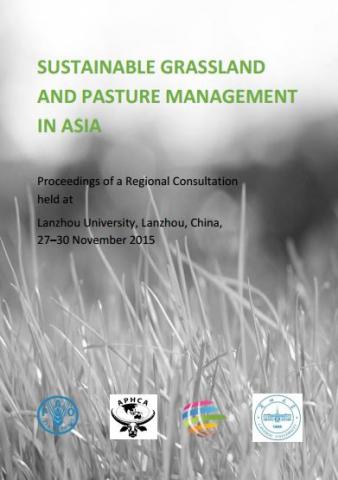FAO, 2016. Proceedings of a Regional Consultation held at Lanzhou University, Lanzhou, China, 27–30 November 2015
The concluding session focused on producing and fine tuning key messages from the two-day technical presentations and panel discussions, suitable for communicating to policy-makers.
Key messages to policy-makers
- It was recognized that science-based policy advocacy is essential to support sound policy development for grassland management and restoration.
- Adequate resource allocation is critical for policy implementation. So funds need to be allocated for this purpose.
- Failure to restore and rehabilitate grasslands is a signification driver of climate change. So it should be given due consideration in the policy formulation process.
- Each country should have one project that demonstrates how to characterize the values that both sellers and buyers can take into account.
- Local people are environment service providers. They should benefit from conservation processes, and their concerns should be given due attention in policy-making.
- Develop mechanisms and find ways to connect science and research to farmers in an effective way in policy guidelines.
- International organizations should play more pronounced roles in the policy process at international, regional and national levels
- The transboundary nature of the problem should be recognized and addressed in the policymaking process.
- Rangelands have multiple functions, including biodiversity conservation; ecosystem services; socio-economic and cultural values. Formulate appropriate policies implementable on the ground through local people, respecting their traditional knowledge and culture.
- Ways to sustain the process are needed to devise appropriate mechanisms to empower the pastoral and local people, and to recognizing them as the custodians of rangeland resources.
Way forward
It was generally recognized by all the participants that this meeting is the beginning of a process that they hope to be continued. For continuation, it was urged that participants should remain interconnected and communicate actively with each other, and it was further proposed to set up a forum for this purpose.
It was further suggested that international forums, such as the Global Agenda for Sustainable Livestock and and Pastoral Hub could be used for this purpose. ICIMOD could also play an important role because it has formal collaboration and strategic partnerships with policy-makers and research organization in the HKH region. It was further advised that Lanzhou University could set up its own forum and could play an important role for communication and dissemination of information in the region, reflecting its specialty in grassland research in China.
This volume is based on the discussions of the Regional Consultation on the Sustainable Grassland and Pasture Management in Asia, held at Lanzhou University, Lanzhou in November 2015. The consultation was organized jointly by - FAO Regional Office for Asia and the Pacific, Animal Production and Health Division (AGA) of FAO, the Animal Production and Health Commission for Asia and the Pacific (APHCA), Global Agenda for Sustainable Livestock (GASL) and Lanzhou University.


